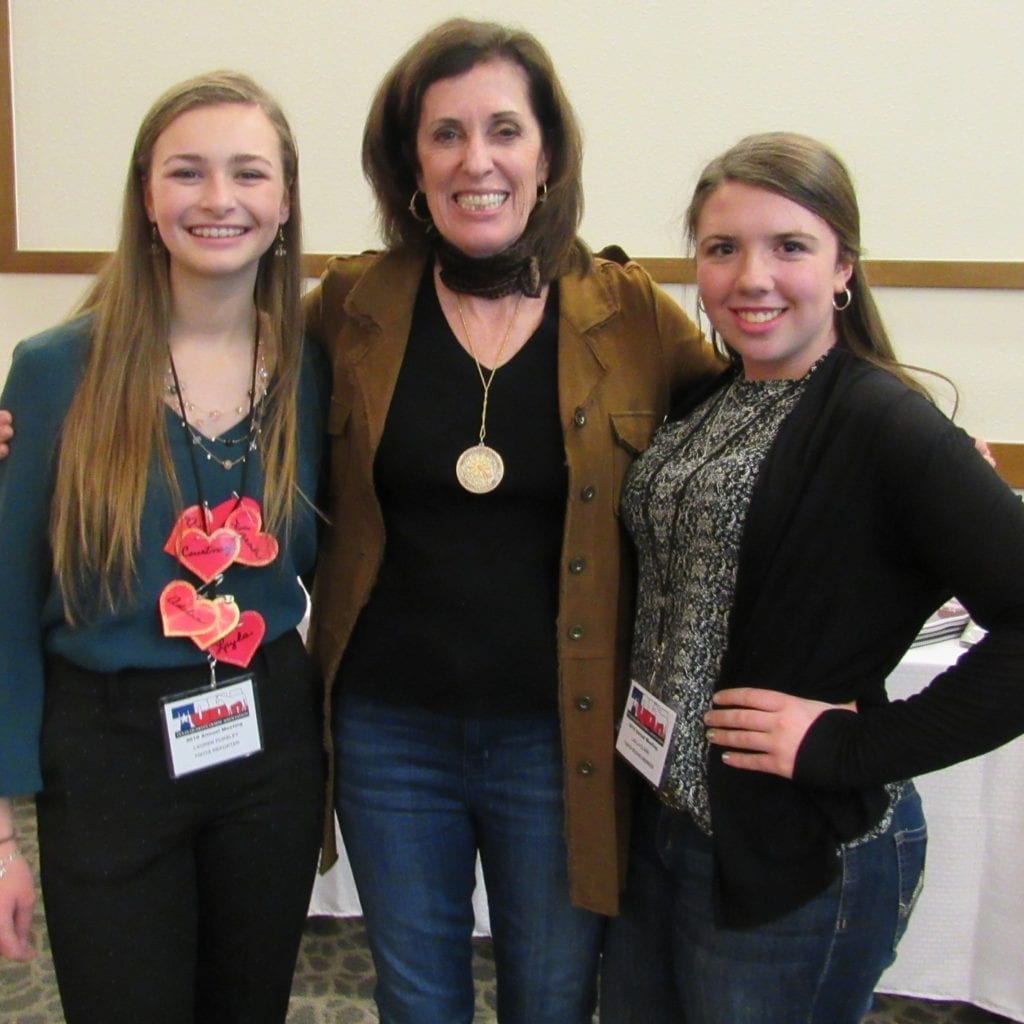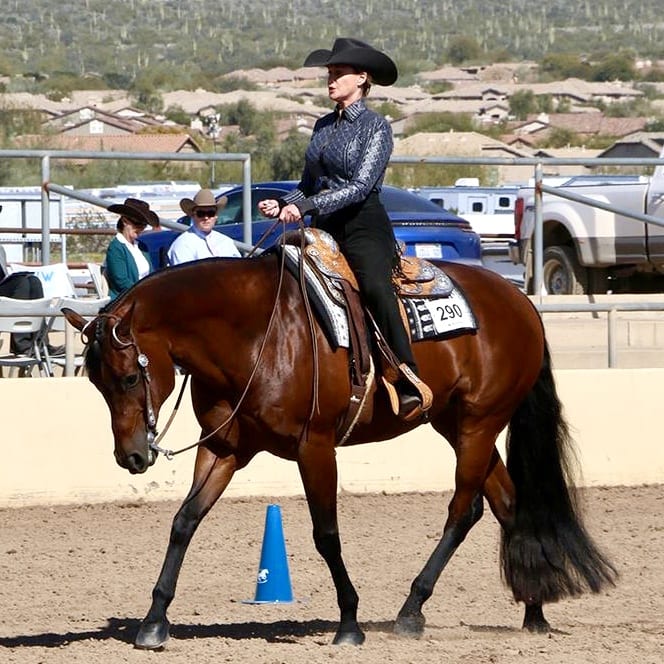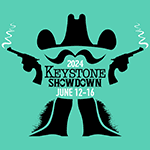We all love to win. It’s our competitive nature as equestrians, but what does it mean to you to be a winner?
Trainer Barbra Schulte says, “Winning is consistently doing your personal best with your horse in the show arena. Winning is measured by you, not just by external results.”
Schulte is a professional horse trainer, author and personal performance coach. Barbra grew up on a ranch in Southern Illinois where she and her siblings would have the job of riding and later selling performance horses at shows.
Schulte is now inducted into the National Cowgirl Hall of Fame and was the American Quarter Horse Association’s National Female Equestrian of the Year in 2000.
Schulte shares the following tips on how to stay mentally tough in the show pen.
What is Mental Toughness?
Also known as mental skills or mental game, being mentally tough means that you calm your emotions on command. “Mental toughness brings emotions to a calm, clear state that is universal to every athlete and person,” Barbra says.
Some people assume the mental game is a rare gift; some have it, some don’t. Many studies have proven those assumptions wrong. Mental toughness is a trainable skill that benefits every person, equestrian and athlete.
Ideal Performance State (IPS)

Often referred to as being in the zone, the ideal state for athletes to perform is to be, as Barbra says, “supercharged” or at high energy, calm and focused. She states, “You’ll know you’re in IPS by how you feel.” It’s when you feel ready to take on the world and full of calm, assured confidence. Believing in yourself is one of the best ways to get into the IPS.
There are three other universal emotions that are felt at the in-gate aside from IPS: tanking, anger and nervousness.
Tanking
Also called blame, tanking the furthest away from being at the IPS. If you keep blaming the problems on someone or something else, you’ll never get to the source of the problem.
Barbra reminds us to “Be clear with yourself and seek to understand where you make an error instead of hiding from it. If you look over everything with a broad brush, you won’t catch mistakes.”
When you make a mistake think “No problem. Next time.” Mistakes are a place where you get to learn.
Anger
We all get upset sometimes, but mad is no way to feel walking into the show arena. Although anger isn’t your Ideal Performance State, you’re closer to being at IPS than when you’re blaming something else. When you’re angry, you’ll feel a little more fired up, determined and strong.
You won’t be as focused as when you’re in IPS, but you’ll have the competitive drive that you need. Barbra says one of the best ways to keep a positive attitude in the show pen is to know “You never compete with others because you can’t control what others, such as the judge or fellow competitors, do.”
Nervousness
The reason nervousness is the closest to being at the Ideal Performance State is because you’re focused on your performance. You are aware of your upcoming job and not as distracted as you are with the other emotions. Being nervous is a normal reaction to high-stress situations.
Barbra’s advice for staying more confident in the show arena is to practice as you perform. She says, “You will always have the same job when you practice as when you perform. The only difference is what surrounds you.”
Acting Tools
Acting tools are what you do with your body to get in show ready mode. Keeping a posture of confidence with your chin up and shoulders back, gets your mind and body prepared to perform. Having calm, rhythmic breathing can help center yourself and straighten your mind.
Keeping your eyes up and choreographed to where you’re going are vital pieces to getting closer to IPS. Barbra says, “Your mind, body and emotions don’t know the difference between real or fake.” Even if you’re not quite at your Ideal Performance State, you can trick yourself into getting there.
Thinking Tools
Thinking tools are what you do with your mind to get better performance. Schulte says, “The number one thinking tool is how you talk to yourself. Tell yourself what you want, never what you don’t want.” If you’re worried about picking up the wrong lead in a performance class, don’t think “Oh man. My horse is terrible at getting the correct lead; I know we’re not going to get it right.”
Instead, try, “We’re going to pick up the correct lead and have a fantastic performance and progress so much from last time.” Having prepared scripts for tough situations can give you another sense of assuredness. Visualizing your ride exactly how you want to ride it, or “re-riding” great rides as well as fixing mistakes in your mind from previous trips can help you be more confident about upcoming performances.
Challenges
Maybe there was some drama in the warm-up pen, or you weren’t placed as well as you had hoped, Barbra says to ask yourself, “What’s my job? What do I have control of?” We all know there are always tough times at shows like a complicated pattern or when an outstanding competitor shows up, Barbra suggests to think, “Bring it on. I love this. If I can do this now, I can do it any time.”
Schulte says the most significant challenge she’s found equestrians struggle with is “fear of judgment by others. We all want to belong and be connected, and we don’t want to be rejected or disconnected because of a ride.”
Barbra’s advice is to only worry about pleasing yourself. If you worry about pleasing too many people at once, you won’t end up happy.
Nobody knows your journey to getting where you are today. We all need to learn to love our own story for what it is and, as Barbra calls it, “Coming home to ourselves.” Think of how mentally tough you are as an equestrian. It takes so much tenacity, courage, patience and mental strength to be able to be judged on your ability to communicate with your horse.
Schulte remarked, “You can never lose. You are a winner because you dare to walk in the show pen.”
GoHorseShow Intern Lauren Pursley is a devoted youth equestrian showing in the all-around events with her horse Lovin Some Lazy Lola. Lauren is the current Texas Quarter Horse Youth Association Reporter. In addition to competing in AQHA shows, Lauren competes in Interscholastic Equestrian Association (IEA) horse shows, 4H Horse Judging and is a member of the 4H Veterinary Science Club. Lauren enjoys working with horses, writing about horses, and equine photography.








